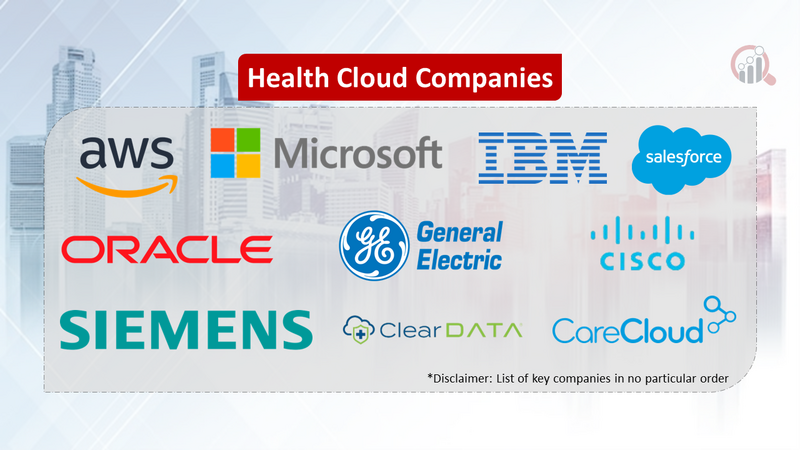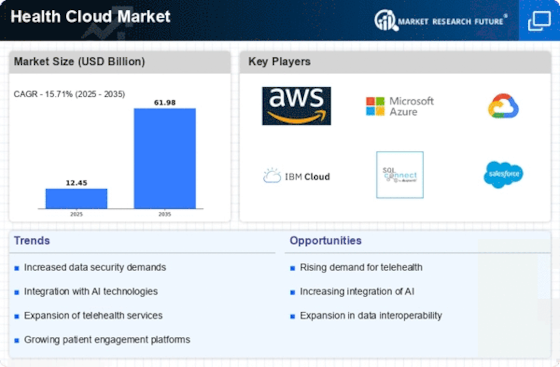Top Industry Leaders in the Health Cloud Market

Competitive Landscape of the Health Cloud Market:
The Health Cloud Market is experiencing explosive growth, fueled by the increasing need for data-driven solutions, patient engagement platforms, and cost-effective IT infrastructure. This dynamic landscape is characterized by established players, nimble startups, and a diverse range of offerings. Understanding the competitive landscape is crucial for healthcare organizations and technology providers alike.
Key Players:
- Amazon Web Services (US)
- Microsoft Corporation (US)
- IBM Corporation (US)
- Oracle Corporation (US)
- Salesforce (US)
- General Electric Company (US)
- Cisco Systems (US)
- Siemens AG (Germany)
- ClearData Networks Inc. (US)
Strategies Adopted:
- Specialization: Players are focusing on specific segments within the healthcare cloud market, such as provider-facing solutions, payer-focused analytics, or life sciences research. This deepens expertise and caters to targeted needs.
- Partnerships and Acquisitions: Collaborations with healthcare providers, technology vendors, and research institutions are common. This expands reach, accelerates innovation, and fosters ecosystem development.
- Compliance and Security: Healthcare data privacy and security are paramount. Players invest heavily in robust security measures and compliance certifications to build trust and address regulatory concerns.
- Data-Driven Insights: Leveraging AI and machine learning to derive actionable insights from healthcare data is a key differentiator. Players offer solutions for predictive analytics, clinical decision support, and personalized medicine.
- Interoperability: Seamless integration with existing healthcare IT systems is crucial for adoption. Players are developing open APIs and standards to facilitate data exchange and workflow optimization.
Factors for Market Share Analysis:
- Product Portfolio: Breadth and depth of cloud solutions offered, including EHR integration, data analytics, patient engagement tools, and security features.
- Customer Base: Market share is often measured by the number of healthcare organizations and patients using the platform. Focus on specific segments or regions can influence market share distribution.
- Financial Performance: Revenue growth, profitability, and investment in research and development are indicators of a company's competitive position.
- Brand Reputation: Trust and recognition within the healthcare community play a significant role in influencing market share.
New and Emerging Companies:
Several startups are making waves in the health cloud market, bringing fresh perspectives and innovative solutions. Examples include:
- Babylon Health: Utilizing AI-powered virtual assistants for patient consultations and chronic disease management.
- Guardant Health: Offering comprehensive cancer diagnostics and treatment optimization through next-generation sequencing technology.
- Tempus: Providing a cloud-based platform for genomic data analysis and precision medicine research.
- Pear Therapeutics: Developing FDA-approved digital therapeutics for mental health conditions, delivered through mobile apps.
Current Company Investment Trends:
- Artificial Intelligence (AI) and Machine Learning (ML): Significant investments are being made in AI-powered solutions for clinical decision support, fraud detection, and personalized medicine.
- Internet of Things (IoT): Integrating wearables and medical devices with cloud platforms is enabling real-time data collection and remote patient monitoring.
- Blockchain: Exploring the potential of blockchain technology for secure data sharing and patient record management.
- Cloud-Based Research and Development: Platforms are being developed to facilitate collaborative research and clinical trial data management in the cloud.
Latest Company Updates:
January 5, 2024, Google Cloud announces a strategic partnership with Cerner to offer healthcare providers cloud-based EHR and revenue cycle management solutions.
December 6, 2023, Amazon Web Services (AWS) announces a collaboration with Mayo Clinic to develop and deploy AI-powered solutions for healthcare.
November 15, 2023, Microsoft partners with Teledoc Health to integrate virtual care capabilities into its Azure cloud platform.










